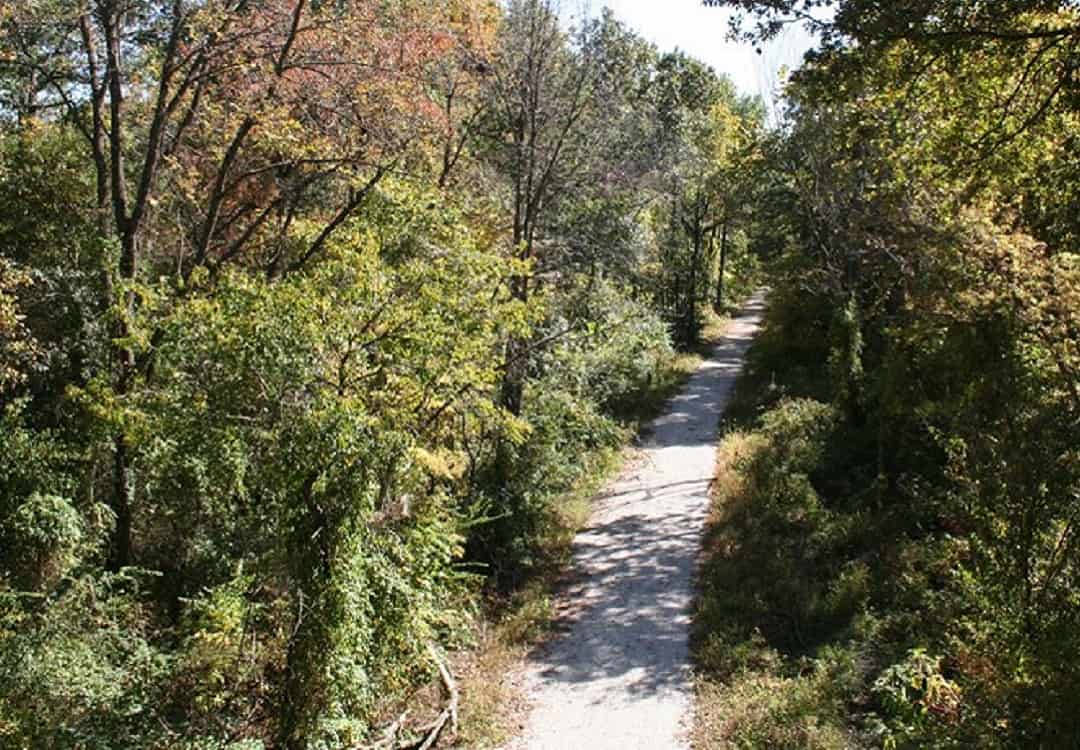The Missouri Department of Natural Resources announced on December 14 it is accepting ownership of the Rock Island Corridor. The department plans to develop the 144 miles of the former Chicago, Rock Island, and Pacific Railroad corridor, which stretches from Windsor to Beaufort, Missouri, into a public recreational trail. Missouri Central Railroad Company, a wholly owned subsidiary of Ameren Missouri, donated the property at no cost to the state.
Representatives from the Department of Natural Resources made the announcement at an outdoor ceremony at Rock Island Park in Eldon. Governor Mike Parson and representatives from Ameren Missouri, the Missouri Department of Economic Development, the Missouri State Parks Foundation, and other elected officials participated in the acceptance ceremony.
The Missouri Department of Natural Resources currently owns and operates the Rock Island Spur of the Katy Trail, a 47-mile multi-use trail located on the Rock Island Corridor from Windsor to Pleasant Hill. The development of this additional 144-mile section of the Rock Island Corridor from Windsor to Beaufort will expand the opportunity for visitors to participate in family-friendly outdoor recreation and benefit many rural communities, including Versailles, Eldon, Eugene, Meta, Argyle, Freeburg, Belle, Bland, Owensville, Rosebud, Gerald, Leslie and Beaufort.
“With the recent award of the $2.7 million Economic Development Administration grant and other potential funding through the American Rescue Plan Act, donations and grants, the Department of Natural Resources is able to accept the Rock Island Corridor today,” said Dru Buntin, director of the Department of Natural Resources.
“With more than 30 years of experience with the Katy Trail, we want the Rock Island Trail to be a good neighbor, and we envision the Rock Island complementing the Katy,” said David Kelly, director of the Division of Missouri State Parks. “I’m looking forward to working with landowners and communities along the trail as the development progresses.”
“The Rock Island Trail will be the second rail-to-trail state park system in our state and will complement our existing Katy Trail,” Governor Parson said. “Much like the Katy Trail, we expect the Rock Island Trail to help grow local economies and small businesses, create jobs, and provide Missouri with another great outdoor recreational resource. Missouri’s tourism industry is strong, and projects like this one only help it grow stronger. We are proud to support the development of the Rock Island Trail.”
“We’re excited to officially transfer the ownership of the Rock Island Trail to the Missouri Department of Natural Resources, bringing the state one step closer to transforming the corridor into a world-class recreation destination,” said Mark Birk, senior vice president for customer and power operations at Ameren Missouri. “For years, many partners, including the Missouri Department of Natural Resources, the Missouri State Parks Foundation, the Missouri Parks Association, Missouri Rock Island Trail Inc., Rails-to-Trails Conservancy, Missouri Bicycle and Pedestrian Federation, Missourians for Responsible Transportation, and all the supportive communities along the corridor have advocated for this visionary project. We are inspired by the trail’s potential to provide Missourians and visitors with a new way to enjoy our beautiful state, bringing tourism dollars and economic development to communities along the corridor.”
The department entered into an Interim Trail Use Agreement with Missouri Central Railroad Company in 2019 to railbank this section of the Rock Island Corridor. Railbanking, established in 1983 as an amendment to Section 8(d) of the National Trails System Act, is a voluntary agreement between a railroad company and a trail agency to use an out-of-service rail corridor as a trail until a railroad might need the corridor again for rail service. This interim trail use of railbanked corridors has preserved thousands of miles of rail corridors that would otherwise have been abandoned.
Development of the trail will occur in sections over several years, as each section of the corridor has different features and challenges. Missouri State Parks will begin hosting public meetings in communities along the trail in January to gather public input and understand the needs and goals of each community and landowners along the corridor.


Hooray for Missouri. Hooray for cyclists and other trail users! Hail to all past, present and future supporters of the Rock Island Trail. May there be speedy progress in completion of this great project.